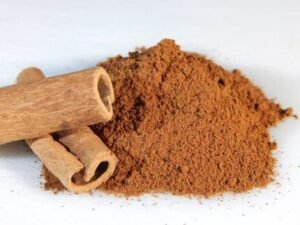Medically reviewed by Dr. Ramesh Gaddam, M.D. — Written by Sumalatha, D.N.H.E
Table of Contents
ToggleCinnamon is a spice made from the bark of certain trees. It is brown and has a sweet, warm flavor. People use it in cooking and baking to add taste to foods like cookies, cakes, and cereals. It can also be sprinkled on drinks like hot chocolate or coffee.
Cinnamon Nutrition
Nutritional profile of ground cinnamon per 1 tablespoon (8 grams):
| Nutrient | Amount per 1 tbsp (8g) |
|---|---|
| Calories | 19 |
| Carbohydrates | 6.3 g |
| Dietary Fiber | 4.1 g |
| Sugars | 0.2 g |
| Protein | 0.3 g |
| Fat | 0.1 g |
| Vitamin A | 8 IU |
| Vitamin C | 0.2 mg |
| Vitamin K | 2.4 mcg |
| Calcium | 78 mg |
| Iron | 0.6 mg |
| Magnesium | 4.7 mg |
| Phosphorus | 5.5 mg |
| Potassium | 33 mg |
| Zinc | 0.1 mg |
| Manganese | 1.4 mg |
Health Benefits of Cinnamon
Cinnamon is a popular spice that has been used for thousands of years, not just for its delightful flavor but also for its potential health benefits.

Let’s explore some of the health benefits of this versatile spice.
Rich in Antioxidants
Cinnamon is loaded with powerful antioxidants, such as polyphenols.
Antioxidants help protect the body from oxidative damage caused by free radicals, which can contribute to the aging process and various diseases.
Anti-Inflammatory Properties
Chronic inflammation in the body can lead to several health issues.
Cinnamon contains anti-inflammatory compounds that can help reduce inflammation, potentially lowering the risk of disease.
Supports Heart Health
Cinnamon has been shown to improve some key risk factors for heart disease.
It can reduce levels of bad LDL cholesterol and triglycerides, while maintaining good HDL cholesterol levels.
Additionally, it helps to reduce blood pressure, which is beneficial for heart health.
Helps Regulate Blood Sugar Levels
One of the most well-known benefits of cinnamon is its ability to help manage blood sugar levels.
Cinnamon can decrease the amount of glucose that enters the bloodstream after a meal and improve insulin sensitivity, which is crucial for those managing diabetes.
Antimicrobial Effects
Cinnamon has antimicrobial properties that can help fight off bacteria and fungi.
This makes it useful for preserving food and treating infections.
It has also been shown to have an inhibitory effect on certain bacterial growth, which can promote better oral health by combating bad breath and tooth decay.
May Protect Against Neurodegenerative Diseases
Neurodegenerative diseases like Alzheimer’s and Parkinson’s are characterized by progressive loss of brain function.
Some studies suggest that compounds found in cinnamon may inhibit the buildup of tau protein in the brain, which is a hallmark of Alzheimer’s disease, and improve motor function in those with Parkinson’s disease.
May Have Anti-Cancer Properties
Research has indicated that cinnamon may have protective effects against cancer.
Its anti-inflammatory, antioxidant, and antimicrobial properties contribute to its potential as a natural cancer-fighting agent.
Studies have shown that cinnamon extracts can slow the growth of cancer cells and induce cancer cell death.
Summary:
Cinnamon is more than just a delicious spice; it’s packed with health benefits that can contribute to overall well-being.
From its antioxidant and anti-inflammatory properties to its potential in managing blood sugar and protecting against diseases, incorporating cinnamon into your diet can be a simple and tasty way to enhance your health.
Cinnamon Uses
Cinnamon is a versatile spice that can be used in many different ways, ranging from culinary applications to medicinal uses.
Its distinct aroma and flavor make it a popular ingredient in various dishes, while its health benefits add value to its use in traditional medicine.

Let’s explore the diverse uses of cinnamon.
Baking and Cooking
Cinnamon is a staple in baking and is used to add flavor to a variety of desserts such as cookies, cakes, and pastries.
It’s also used in savory dishes, especially in Middle Eastern and Indian cuisines, to enhance the taste of meat, stews, and rice dishes.
Beverages
Cinnamon is often added to drinks to enhance their flavor. It can be sprinkled on top of hot beverages like coffee, hot chocolate, and tea.
It’s also used in mulled wine, cider, and certain cocktails to add a warm, spicy note.
Cereals and Breakfast Foods
A sprinkle of cinnamon can add a delicious touch to breakfast foods like oatmeal, pancakes, and French toast.
It’s also commonly used in cereals and granola for added flavor and health benefits.
Blood Sugar Regulation
Cinnamon has been shown to help regulate blood sugar levels, making it a useful supplement for people with diabetes or those looking to manage their blood sugar.
Anti-Inflammatory and Antioxidant Properties
Cinnamon’s anti-inflammatory and antioxidant properties make it valuable in reducing inflammation and combating oxidative stress in the body, which can help prevent chronic diseases.
Digestive Health
Cinnamon can aid in digestion by helping to break down fats and reduce bloating.
It has been used traditionally to relieve digestive discomfort and improve gut health.
Air Freshener
Cinnamon’s pleasant aroma makes it an excellent natural air freshener.
You can simmer cinnamon sticks in water or use cinnamon essential oil in a diffuser to freshen up your home.
Natural Cleaner
Cinnamon has antimicrobial properties that make it useful as a natural cleaner.
It can be used in homemade cleaning solutions to disinfect surfaces and leave a pleasant scent.
Skin Care
Cinnamon is used in some natural skincare products due to its antimicrobial and anti-inflammatory properties.
It can help with acne and improve skin texture. However, it should be used with caution and properly diluted to avoid skin irritation.
Lip Plumpers
Cinnamon is sometimes used in lip plumping products because it can cause a temporary swelling effect, making lips appear fuller.
This is usually achieved by adding a small amount of cinnamon oil to lip gloss or balm.
Summary:
Cinnamon is a highly versatile spice with numerous uses in the kitchen, medicine cabinet, and even around the house.
Its unique flavor enhances a variety of dishes, while its health benefits make it a valuable addition to traditional and modern medicinal practices.
Whether you’re baking a delicious treat or looking to improve your health, cinnamon is a wonderful spice to include in your daily life.
Side Effects of Cinnamon
While cinnamon offers numerous health benefits, it’s important to be aware that consuming it in large amounts can lead to certain side effects.

Understanding these potential risks can help you enjoy cinnamon safely.
Liver Damage
Cinnamon contains a compound called coumarin, which can be harmful to the liver in high doses.
Regularly consuming large amounts of cinnamon, especially Cassia cinnamon (which has higher coumarin levels), can lead to liver damage.
It’s essential to limit your intake to avoid this risk.
Allergic Reactions
Some people may be allergic to cinnamon. Symptoms of an allergic reaction can include skin irritation, mouth sores, and swelling of the gums or tongue.
If you experience these symptoms, it’s important to stop using cinnamon and consult a healthcare professional.
Mouth Sores
Consuming too much cinnamon, particularly in its ground form, can cause mouth sores or irritation.
This is because cinnamon can be abrasive and irritating to the sensitive tissues inside the mouth.
To avoid this, it’s best to use cinnamon in moderation and be mindful of its effects on your mouth.
Interactions with Medication
Cinnamon can interact with certain medications, particularly those used to manage diabetes, blood pressure, and blood thinning.
Because cinnamon can affect blood sugar levels and blood clotting, it may enhance the effects of these medications, leading to complications.
Always consult with a healthcare provider before adding significant amounts of cinnamon to your diet if you are on medication.
Respiratory Issues
Inhaling cinnamon powder, whether accidentally or intentionally, can cause respiratory problems.
This is because the fine particles can irritate the lungs and airways, leading to coughing, gagging, or even difficulty breathing.
It’s important to handle cinnamon powder carefully to avoid inhaling it.
Low Blood Sugar
While cinnamon can help regulate blood sugar levels, consuming too much can lead to hypoglycemia, or abnormally low blood sugar.
This is particularly a concern for individuals with diabetes who are also taking medication to lower blood sugar levels.
Symptoms of hypoglycemia include dizziness, confusion, and fainting.
Increased Risk of Cancer (for Cassia Cinnamon)
High coumarin content in Cassia cinnamon has been linked to an increased risk of certain cancers in animal studies.
Although more research is needed to confirm this risk in humans, it’s advisable to consume Cassia cinnamon in moderation and opt for Ceylon cinnamon, which has lower coumarin levels, whenever possible.
Summary
While cinnamon can be a beneficial addition to your diet, it’s crucial to be aware of its potential side effects.
Consuming it in moderation and being mindful of how it interacts with your body and medications can help you enjoy its benefits without experiencing adverse effects.
Always consult with a healthcare professional if you have concerns about adding cinnamon to your diet.
Cinnamon Benefits for Females
Cinnamon is a spice with numerous health benefits that can be particularly advantageous for females.
From hormonal balance to skin health, cinnamon offers various benefits that cater to women’s unique health needs.

Let’s explore some of these benefits in detail.
Hormonal Balance
Cinnamon can help regulate menstrual cycles and reduce symptoms of polycystic ovary syndrome (PCOS).
Studies suggest that cinnamon may improve insulin resistance, which is often associated with PCOS, thus helping to manage the condition more effectively.
Menstrual Pain Relief
Cinnamon’s anti-inflammatory properties can help alleviate menstrual cramps and pain.
Consuming cinnamon tea or incorporating cinnamon into your diet during your menstrual cycle can provide relief from discomfort.
Blood Sugar Control
Women, especially those with conditions like gestational diabetes, can benefit from cinnamon’s ability to help regulate blood sugar levels.
By improving insulin sensitivity, cinnamon can help maintain stable blood glucose levels.
Antioxidant and Anti-Inflammatory Effects
Cinnamon is rich in antioxidants, which can help combat oxidative stress and reduce inflammation.
This can be particularly beneficial for women experiencing chronic inflammatory conditions, such as rheumatoid arthritis.
Bone Health
Cinnamon contains essential minerals like calcium and manganese, which are crucial for maintaining strong bones.
Adequate intake of these minerals can help prevent bone-related issues, such as osteoporosis, which is more common in women as they age.
Skin Health
Cinnamon’s antimicrobial properties make it effective in treating acne and other skin infections.
It can help reduce acne-causing bacteria and promote clearer skin. Additionally, cinnamon’s anti-inflammatory effects can soothe skin irritation and redness.
Weight Management
Cinnamon can aid in weight management by improving metabolism and helping control appetite.
Its ability to stabilize blood sugar levels can also prevent sugar cravings and overeating, making it easier to maintain a healthy weight.
Cardiovascular Health
Cinnamon can contribute to heart health by lowering bad LDL cholesterol and triglycerides while maintaining good HDL cholesterol levels.
This can reduce the risk of cardiovascular diseases, which is a significant concern for women, especially after menopause.
Cognitive Function
Cinnamon may help improve cognitive function and protect against neurodegenerative diseases.
For women concerned about cognitive decline with age, incorporating cinnamon into their diet can offer protective benefits for brain health.
Summary
Cinnamon offers a wide range of health benefits that can be particularly beneficial for females.
From hormonal balance and menstrual pain relief to skin health and cardiovascular protection, this versatile spice can support various aspects of women’s health.
Including cinnamon in your diet can be a simple yet effective way to enhance overall well-being.
Cinnamon Benefits for Skin
Cinnamon is not only a delightful spice used in cooking but also offers numerous benefits for skin health.

Its antimicrobial, anti-inflammatory, and antioxidant properties make it a valuable ingredient in skincare.
Let’s explore the various ways cinnamon can benefit your skin.
Acne Treatment
Cinnamon has powerful antimicrobial properties that can help fight the bacteria responsible for acne.
When used in skincare, cinnamon can help reduce acne breakouts and prevent future ones.
A popular home remedy is mixing cinnamon with honey to create a natural acne-fighting mask.
Anti-Inflammatory Effects
Cinnamon’s anti-inflammatory properties can help soothe irritated skin and reduce redness.
This makes it beneficial for conditions like acne, eczema, and rosacea. Applying cinnamon-infused products can calm the skin and reduce inflammation.
Anti-Aging Benefits
Cinnamon is rich in antioxidants, which help combat free radicals that cause skin aging.
These antioxidants can help reduce the appearance of fine lines and wrinkles, promoting a more youthful complexion.
Regular use of cinnamon in skincare can help maintain skin elasticity and firmness.
Enhances Blood Circulation
Cinnamon can improve blood flow to the skin, resulting in a healthier, more radiant complexion.
Better circulation means more oxygen and nutrients are delivered to the skin cells, promoting a natural glow and improving skin texture.
Skin Plumping
Cinnamon can temporarily plump the skin and lips by stimulating blood flow to the surface.
This effect can make lips appear fuller and skin look more youthful.
A simple DIY lip plumper can be made by mixing a pinch of cinnamon with petroleum jelly or lip balm.
Exfoliation
Cinnamon can act as a natural exfoliant to remove dead skin cells and promote cell turnover.
This helps to unclog pores, smooth out the skin’s surface, and reveal a fresher, more radiant layer of skin.
A gentle cinnamon scrub can be made by combining cinnamon powder with sugar and a carrier oil like coconut oil.
Skin Brightening
Regular use of cinnamon in skincare can help brighten the skin and even out skin tone.
Its exfoliating properties help remove dead skin cells, while its antimicrobial effects can reduce blemishes and discoloration, leading to a clearer, more luminous complexion.
Treating Skin Infections
Cinnamon’s antimicrobial properties can also help treat various skin infections.
It can inhibit the growth of bacteria and fungi, making it effective for conditions like athlete’s foot and other fungal infections.
Applying a cinnamon paste to the affected area can help speed up the healing process.
Summary
Cinnamon offers a multitude of benefits for skin health, from treating acne and reducing inflammation to providing anti-aging and skin-brightening effects.
Incorporating cinnamon into your skincare routine, either through DIY treatments or commercial products, can help achieve healthier, more radiant skin.
However, it’s important to perform a patch test before using cinnamon on your skin to ensure you do not have an allergic reaction.
Cinnamon Benefits for Hair
Cinnamon is not only beneficial for your health and skin but also offers numerous advantages for hair care.

Its natural properties can help improve hair growth, strength, and overall health.
Let’s explore the various benefits of using cinnamon for your hair.
Promotes Hair Growth
Cinnamon can stimulate blood circulation to the scalp, promoting hair growth.
Improved blood flow means that more nutrients and oxygen reach the hair follicles, which can lead to healthier and faster hair growth.
You can create a hair mask using cinnamon, honey, and olive oil to nourish your scalp and encourage growth.
Strengthens Hair
Cinnamon contains vital nutrients that can help strengthen hair strands, reducing breakage and split ends.
Regular use of cinnamon-based treatments can help fortify the hair, making it more resilient and less prone to damage.
Reduces Hair Loss
By stimulating the scalp and strengthening hair follicles, cinnamon can help reduce hair loss.
Its antimicrobial properties can also keep the scalp healthy and free from infections that might contribute to hair loss.
Applying a cinnamon and coconut oil mixture to the scalp can be an effective treatment.
Improves Scalp Health
Cinnamon’s antifungal and antibacterial properties can help maintain a healthy scalp by preventing and treating conditions like dandruff and itchy scalp.
A cinnamon-infused scalp treatment can help cleanse the scalp and keep it free from infections.
Adds Shine and Luster
Using cinnamon in your hair care routine can add natural shine and luster to your hair.
It helps to smooth the hair cuticle, which enhances light reflection and gives your hair a healthy, glossy appearance.
A cinnamon hair mask or rinse can be used to achieve this effect.
Natural Hair Lightener
Cinnamon can be used as a natural hair lightener.
When combined with honey and a conditioner, cinnamon can help lighten hair gradually and naturally without the use of harsh chemicals.
This method is particularly useful for those looking to add subtle highlights or lighten their hair color.
Conditions Hair
Cinnamon can help condition the hair, leaving it softer and more manageable.
Its nourishing properties help to moisturize and hydrate the hair, improving its overall texture.
Mixing cinnamon with a hydrating ingredient like yogurt or avocado can create a deeply conditioning hair mask.
Fights Scalp Infections
Due to its antimicrobial properties, cinnamon can help fight off scalp infections that might affect hair health.
It can reduce symptoms of scalp conditions such as seborrheic dermatitis and scalp psoriasis.
Regular use of a cinnamon scalp treatment can help keep these conditions under control.
Summary
Cinnamon offers a variety of benefits for hair health, from promoting growth and reducing hair loss to improving scalp health and adding shine.
Incorporating cinnamon into your hair care routine through masks, treatments, and rinses can help achieve stronger, healthier, and more beautiful hair.
Always perform a patch test before using cinnamon on your scalp to ensure you do not have an allergic reaction.
Cinnamon Benefits for Weight Loss
Cinnamon is often touted as a natural aid for weight loss due to its potential to positively impact metabolism, blood sugar levels, and appetite control.

Here are several ways cinnamon may benefit weight loss:
Regulates Blood Sugar Levels
Cinnamon has been shown to improve insulin sensitivity and lower blood sugar levels by slowing the rate at which glucose enters the bloodstream after a meal.
This can help prevent spikes and crashes in blood sugar levels, reducing cravings for sugary foods and promoting overall better blood sugar control.
Increases Metabolism
Research suggests that cinnamon may have thermogenic properties, meaning it could slightly increase the body’s metabolic rate and the amount of calories burned for energy.
While the effect may be modest, every little bit can contribute to weight loss efforts over time.
Suppresses Appetite
Cinnamon may help control appetite by stabilizing blood sugar levels and delaying the emptying of the stomach, leading to a feeling of fullness and reduced hunger.
This can potentially result in fewer calories consumed throughout the day, aiding in weight loss.
Reduces Belly Fat
Some studies suggest that cinnamon may specifically target visceral fat, which is the type of fat stored around the abdomen and organs and is associated with increased risk of metabolic disorders.
By improving insulin sensitivity and promoting fat metabolism, cinnamon may help reduce belly fat accumulation.
Supports Digestive Health
Cinnamon has been traditionally used to aid digestion and relieve gastrointestinal discomfort.
A healthy digestive system is essential for efficient nutrient absorption and metabolism, which can indirectly contribute to weight management.
Enhances Flavor without Calories
Adding cinnamon to foods and beverages can enhance their flavor and sweetness without adding extra calories or sugar.
This can be particularly beneficial for individuals looking to reduce their calorie intake while still enjoying satisfying meals and snacks.
Combats Cravings
The sweet and spicy flavor of cinnamon can help satisfy cravings for sugary or high-calorie foods.
Incorporating cinnamon into meals, snacks, or beverages may help curb cravings and reduce the desire to indulge in unhealthy foods, supporting weight loss efforts.
Summary
While cinnamon alone is not a magical solution for weight loss, incorporating it into a balanced diet and active lifestyle may offer several benefits that support weight management.
By regulating blood sugar levels, boosting metabolism, suppressing appetite, and promoting overall health, cinnamon can be a valuable addition to your weight loss journey.
However, it’s essential to combine cinnamon consumption with other healthy habits, such as regular exercise and portion control, for optimal results.
Cinnamon Benefits Sexually
Cinnamon has been traditionally regarded as an aphrodisiac in various cultures, and while scientific evidence is limited, some potential benefits for sexual health and libido have been suggested:

Increased Blood Flow
Cinnamon may help improve blood circulation throughout the body, including to the genital area.
Improved blood flow can enhance arousal and sensitivity, potentially leading to a more satisfying sexual experience.
Enhanced Sensation
The warming properties of cinnamon may stimulate nerve endings and heighten sensitivity, leading to increased pleasure during sexual activity.
Stress Reduction
Cinnamon has been associated with stress reduction and relaxation due to its aroma and flavor.
By reducing stress and anxiety levels, cinnamon may indirectly improve sexual function and desire.
Hormonal Balance
Some studies suggest that cinnamon may help regulate hormone levels, including testosterone and estrogen, which play essential roles in sexual function and libido.
Balanced hormone levels can contribute to overall sexual health and vitality.
Antioxidant Properties
Cinnamon is rich in antioxidants, which can help protect the body from oxidative stress and damage.
Maintaining optimal health and functioning of the reproductive system is crucial for sexual health, and antioxidants may play a role in supporting these functions.
Aromatherapy Benefits
The aroma of cinnamon has been used in aromatherapy to create a sensual and stimulating atmosphere.
The spicy scent of cinnamon may evoke feelings of warmth and arousal, enhancing the mood for intimacy.
Note of Caution
While cinnamon may offer potential benefits for sexual health and libido, it’s essential to use it in moderation and consult with a healthcare professional if you have any underlying health conditions or concerns.
Additionally, individual responses to cinnamon may vary, so it’s essential to pay attention to how your body reacts to its consumption.
Summary
While scientific evidence supporting cinnamon’s direct effects on sexual health is limited, its potential benefits, such as increased blood flow, enhanced sensation, stress reduction, and hormonal balance, may contribute to improved sexual function and libido for some individuals.
As with any supplement or natural remedy, it’s essential to approach cinnamon as part of a holistic approach to sexual health that includes maintaining overall well-being through healthy lifestyle habits.
Frequently Asked Questions
Users frequently searched for queries related to Cinnamon.
Is it good to drink cinnamon every day?
Drinking cinnamon every day can be beneficial for some individuals, but it’s essential to use it in moderation and consult with a healthcare professional, especially if you have any underlying health conditions or are taking medications.
Is it safe to use cinnamon everyday?
Cinnamon is generally safe when consumed in culinary amounts, but consuming large doses or taking cinnamon supplements regularly may lead to potential side effects or interactions with medications.
What organ is cinnamon good for?
Cinnamon is believed to be beneficial for various organs in the body, including the heart, liver, and digestive system.
Its antioxidant properties can help protect cells from damage, while its ability to regulate blood sugar levels may benefit overall health.
When not to eat cinnamon?
While cinnamon is generally safe for most people, there are certain situations when it’s best to avoid or limit its consumption.
Individuals who are allergic to cinnamon should avoid it altogether.
Additionally, those with liver disease, taking blood-thinning medications, or pregnant should use caution and consult with a healthcare professional before consuming cinnamon regularly.
Can cinnamon reduce belly fat?
Cinnamon is not a magic solution for reducing belly fat, but it may support weight loss efforts when combined with a healthy diet and regular exercise.
Its ability to regulate blood sugar levels and metabolism, as well as its potential to reduce cravings, can contribute to overall weight management.
Is cinnamon good for skin?
Cinnamon has several potential benefits for skin health, including its antimicrobial, anti-inflammatory, and antioxidant properties.
It can help treat acne, improve skin tone, and promote a healthy complexion when used in skincare products or homemade remedies.
Is cinnamon good for hair growth?
Cinnamon may promote hair growth by stimulating blood circulation to the scalp, strengthening hair follicles, and improving overall scalp health.
Using cinnamon-infused hair masks or rinses may help nourish the scalp and support healthy hair growth.
How to use cinnamon to lose weight?
To use cinnamon for weight loss, you can incorporate it into your diet by sprinkling it on foods, adding it to beverages like tea or coffee, or using it in recipes for added flavor.
Additionally, cinnamon can be combined with other weight-loss-friendly ingredients in homemade remedies or supplements.
Does cinnamon burn fat at night?
While some people believe that consuming cinnamon before bed can help burn fat overnight, there is limited scientific evidence to support this claim.
Weight loss is a complex process that requires a combination of healthy eating, regular exercise, and lifestyle habits.
How to reduce abdominal fat?
Reducing abdominal fat requires a holistic approach that includes a balanced diet, regular exercise, stress management, and adequate sleep.
While cinnamon may support weight loss efforts, it’s essential to focus on overall lifestyle changes for long-term success.
Does cinnamon and hot water burn fat?
Some individuals claim that drinking cinnamon and hot water can help burn fat, but there is limited scientific evidence to support this claim.
Drinking hot water with cinnamon may have some health benefits, but it’s unlikely to lead to significant fat burning on its own.
Has anyone lost weight with cinnamon?
Some individuals may experience weight loss benefits from incorporating cinnamon into their diet, but results may vary.
It’s essential to combine cinnamon consumption with other healthy habits for effective and sustainable weight loss.
How much cinnamon a day for weight loss?
The appropriate amount of cinnamon for weight loss can vary depending on individual factors such as age, weight, and overall health.
However, most studies use doses ranging from 1 to 6 grams per day, which is roughly equivalent to 0.5 to 2 teaspoons of ground cinnamon.
It’s essential to start with a small amount and monitor your body’s response, and consult with a healthcare professional if you have any concerns.
Also Read:
Medically reviewed by Dr. Ramesh Gaddam, M.D.

General Physician, Diabetologist, and Critical Care Specialist.
Related
Discover more from Health Build-Up
Subscribe to get the latest posts sent to your email.

1 thought on “101 Health Benefits of Cinnamon for Skin, Hair and More”
Comments are closed.